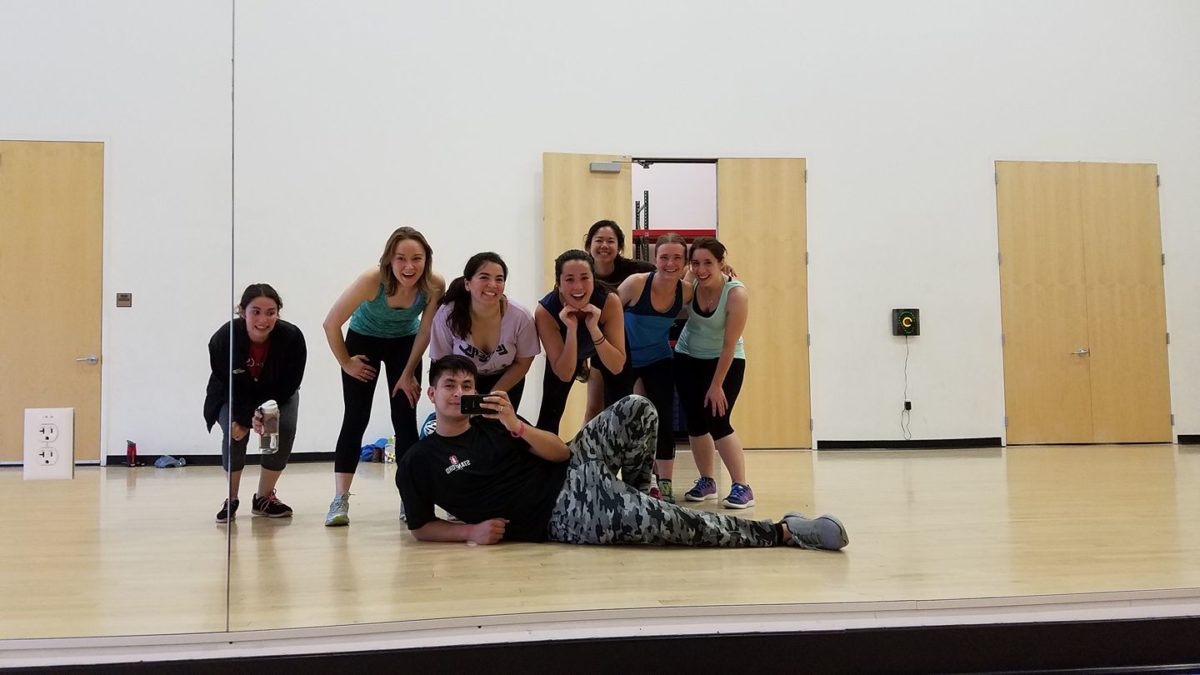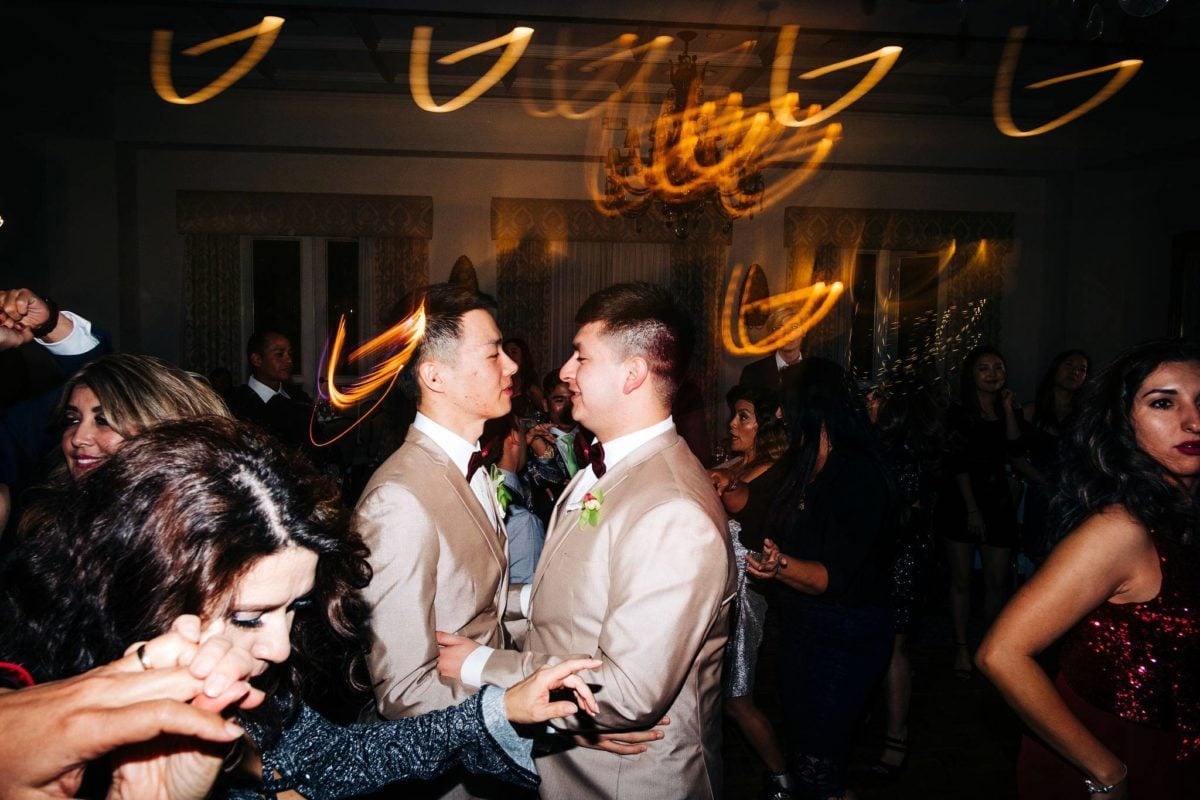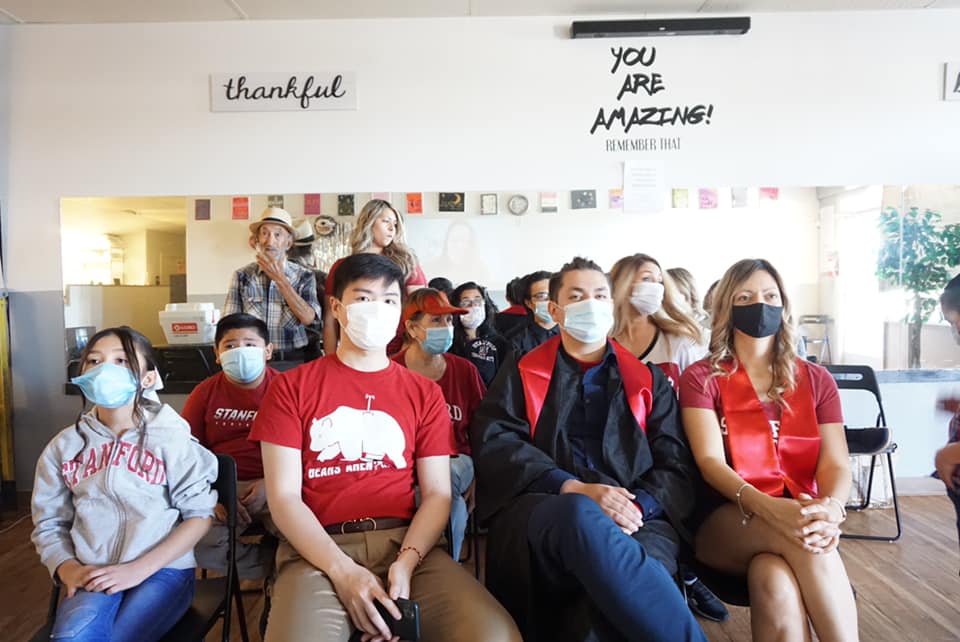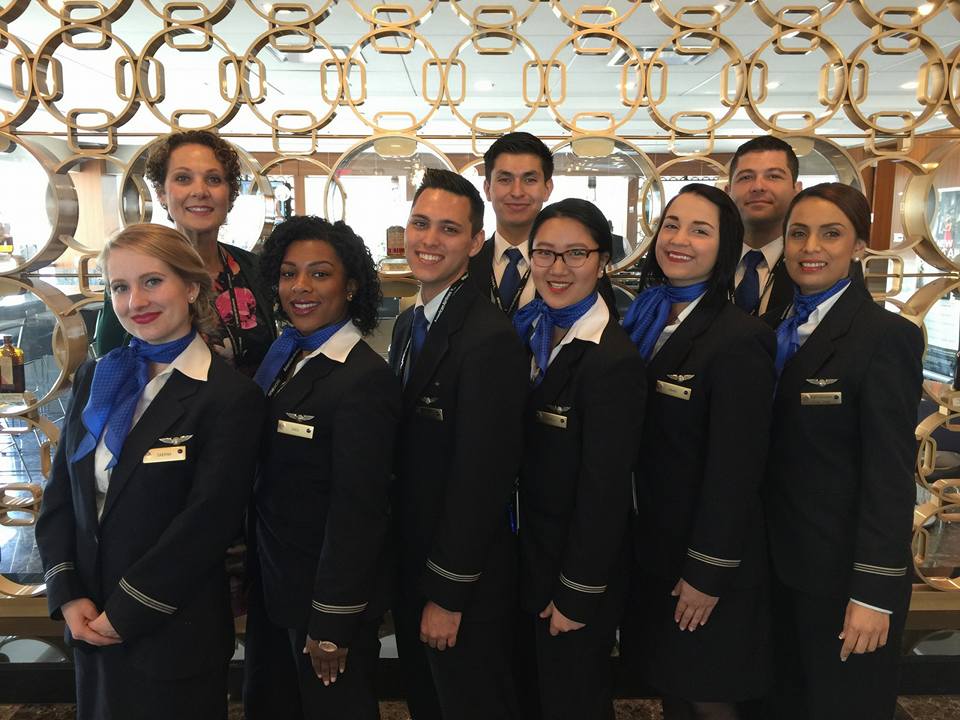The first time Jay Gonzalez ’20 worked as a flight attendant, Gonzalez was trying to do everything at once. The tall 20-year-old, who uses they/them pronouns, had clothed their nerves in a brand-new American Airlines uniform, a neatly knotted royal-blue tie tucked into a navy blue suit. As passengers boarded, Gonzalez helped lift bags into the overhead bins, volunteering for any and every task.
A few minutes in, an older, more senior flight attendant drew Gonzalez aside. “Girl, you’re trying too hard,” Gonzalez remembers being told. Don’t touch passengers’ bags, don’t do too much: If Gonzalez got hurt, the company wouldn’t pay for it, their co-workers advised.
Arcing through the sky from New York City to Phoenix in a Boeing 737, “it went from me doing my best to be customer service to me doing whatever it took to last as long as possible,” Gonzalez recalls of that spring day in 2016.
Gonzalez knew that the first year would be the hardest, and that self-care was essential to make it in the long haul. For flight attendants, the first five years serve as a kind of barometer: “If you make it past five years, you should make it to the rest of your life,” Gonzalez says.
Four years later, that milestone is within reach, but a lot has changed. Just graduated from Stanford University, Gonzalez has built a life on campus, traveled the world and gotten married. Working for American Airlines has meant juggling weekend flights and lingering jetlag on top of the normal college pressures, but it’s also afforded Gonzalez opportunities that most students can only dream of.
And then this spring, just as Gonzalez prepared to spend the final months of college on the ground before jetting off into a relative unknown, the unknown came for them.
* * *
Gonzalez had always wanted to see the world, but had also known that the world wasn’t going to make it easy. Gonzalez grew up Mormon, Mexican-American and gay in the projects of Tucson, Arizona. It was a combination that made it hard to fit in. Being Mormon kept them out of drugs and gang violence, Gonzalez says, but being Mexican — and, even more so, being gay — meant feeling like a perpetual outsider to the church.
Gonzalez was also smart — smart enough to want more than the neighborhood public school could offer. When funding cuts threatened what advanced classes were left, a teacher suggested applying for the Accelerated Learning Laboratory, a charter school with a Chinese exchange program.
The school was 18 miles away, and it took an army — father, grandparents, sisters, aunts — to get Gonzalez to school every day. But once finally there, studying Chinese culture and living in China with host families, Gonzalez felt accepted for the first time.
“I never really fit into the Mexican culture because I’m extremely pale-skinned, and my Spanish wasn’t that good because I grew up here,” Gonzalez says. “On the American side, I never really fit in because I’m Mexican. Regardless of how pale-skinned I was, my last name, where I came from, and everything — my English, especially in Tucson, still had an accent — white people never treated me like an equal.”
“So for me it was like, where do I belong?” Gonzalez continues. “I can’t be Mormon because I’m gay, I can’t be white because I’m Mexican, I can’t be Mexican because I’m pale skinned and because I’m American — what am I supposed to be? When I found Chinese, when I found China — this culture, it was so embracing. It didn’t care who I was or where I came from. They just cared about the fact that I spoke perfect Chinese, and so it was the one culture that fully embraced me for who I was. I dedicated my entire life to China.”
As a senior, Gonzalez was accepted into Stanford, but ended up deferring enrollment for two years to complete a Mormon missionary trip in Thailand and Laos. Gonzalez spent a year and a half as a missionary, doing anything from social programs to yard work.
But with the trip winding down, Gonzalez wasn’t sure when — or if — they would be able to return to Asia. Gonzalez couldn’t afford to go back on their own, but they didn’t want to say goodbye. Gonzalez needed a way to travel without paying for it: ideally, a way to travel and get paid for it. At 20, the youngest age allowed, Gonzalez applied to be a flight attendant for American Airlines, and got the job.
* * *
Entering Stanford as a frosh, Gonzalez was like no one else in the Class of 2020: a 20-year-old flight attendant, spending weekends flying first to American Airlines’ base in Los Angeles, and then to Asia and around the world.
Still, Gonzalez was able to find a home at Stanford. First year, they lived in Okada, the Asian American ethnic theme house. That spring, Gonzalez rushed Lambda Phi Epsilon, the only Asian fraternity on campus; after becoming a Lambda, Gonzalez started the Queer Lamba Network to carve out a space for queer Asians within the Greek system. And Gonzalez also founded Stanford Zumba, training other instructors and leading weekly sessions that drew 60 to 80 people every Friday afternoon to the Roble Arts Gym.
It was a lot to balance. Gonzalez tried to schedule classes for Tuesday through Thursday, clearing the weekend to fly. Some weeks, Gonzalez would have to go straight from Zumba to the airport.
“I schedule everything,” Gonzalez says. “I can only play this amount of time, only talk this amount of time, I have to do work from this to this time. I have to be super efficient. Sometimes, sleep gets thrown out the window.”

But Gonzalez didn’t want to give up flying. In sophomore year, spending fall quarter at Stanford in Kyoto, most of Gonzalez’s routes were to Japan. After being part of Stanford’s inaugural cohort at Peking University the following fall, Gonzalez spent junior year flying back and forth from the West Coast to Beijing or Shanghai.
To break the routine, Gonzalez also signed up to work occasional routes to Brazil, or London, or Sydney — a favorite destination, for its vibrant queer Asian community and its food and its beauty. By the end of senior fall, scheduling routes back to Asia to do research for a senior thesis on gay marriage in Taiwan, Gonzalez had worked flights to over 30 countries.
And, in between, Gonzalez had also flown home to Arizona to get married.
The summer after sophomore year, Gonzalez met Tim Zhang at a cultural event at the Confucius Institute in Tucson. Zhang, a Chinese Ph.D. candidate studying human factors engineering at the University of Arizona, was impressed by Gonzalez, and a little suspicious: Who was this young person who spoke so many languages, who had been to so many countries, who was so young and yet had done so much?
At the event, even though Zhang was the volunteer, Gonzalez was the one who knew everyone. It was enough to convince Zhang that Gonzalez was legit.
All through that summer, Gonzalez and Zhang kept seeing each other. Zhang says he was attracted to how passionate Gonzalez was in so many things, “including relationships,” and so when Zhang went to Philadelphia to spend a few days at an academic conference, Gonzalez followed; when Gonzalez’s niece celebrated her first birthday in Mexico, Gonzalez invited Zhang to come along.
“Do you want to go to Mexico for dinner?” Gonzalez told him, Zhang remembers.
Zhang replied: “Okay?”
Gonzalez’s parents drove Gonzalez, Zhang and two of Gonzalez’s nephews an hour south to Nogales, Mexico, a city just across the border. They celebrated with family and drove home that night.
That summer, Gonzalez and Zhang bonded over shared appreciation for the other’s culture: Zhang speaks Spanish as well as Chinese and English, and studied abroad in Spain.
When Zhang and Gonzalez are together, “we can speak Spanish, we can speak English, Chinese — whatever,” Zhang says. “It’s very comfortable, when you’re with someone who knows your country so well.”
During the fall of 2019, with Gonzalez studying abroad in Beijing, Gonzalez would fly back to Arizona to spend time with Zhang. And in late November, Gonzalez flew back to Tucson for their wedding: “We didn’t get engaged, we just got married,” Zhang says, laughing.
The couple got married at a historic hotel in Tucson: a big wedding, with family and friends from both sides. Gonzalez’ fraternity brothers were there, as well as friends from Zumba.
“The dancing part was the best,” Zhang says.
Zhang moved to San Jose, where he could work remotely. Gonzalez kept flying, up until the end of senior fall. At the beginning of winter quarter, Gonzalez took a leave from American Airlines. Gonzalez wanted to spend their last two quarters on the ground, on Stanford’s campus, finishing up their thesis and making memories with their husband and their friends.
Across the globe, in Zhang’s home country, in Gonzalez’ adopted home, a new virus was beginning to spread.

* * *
COVID-19 emerged in a market in Wuhan, China in late 2019. By January 2020, it was likely already spreading through the United States, although it would be months before the broader American public took notice.
Gonzalez was paying attention earlier than most. At the beginning of the year, flight attendants Gonzalez knew began to fall sick. At the end of January, as cases climbed, American Airlines — along with United and Delta — announced that it was canceling flights to mainland China.
As Stanford lazed through a balmy winter quarter, planes were grounded as air traffic plummeted, and the virus spread across the United States, most visibly in clusters like New York City, Seattle and Stanford’s own Santa Clara County.
And then, in the span of one dizzying week, COVID-19 arrived on campus. On March 6, Stanford announced that winter quarter classes would move online; on March 10, Stanford announced that spring quarter would be online “until further notice”; and on March 13, Stanford announced that a student had tested positive, and told nearly all undergrads to move out.
Gonzalez was among the fraction of Stanford undergraduates approved to stay on campus. As Zhang moved out of the Bay Area and back to Tucson, worried for his health as Santa Clara County emerged as a COVID-19 hotspot, Gonzalez moved into apartment-style graduate housing and started preparing for a lonely spring.
But the upheaval wasn’t over. In mid-March, American Airlines emailed Gonzalez, saying they either had to come back to work or face a much longer furlough.
With Zhang in Tucson, the pair had to talk through their options over video chat. There were the safety concerns to think about, but there were also looming financial pressures. Gonzalez’s mother’s restaurant in Tucson had seen its business decimated by COVID-19, but rent was still due. And if Gonzalez took the furlough, what were they supposed to do after graduation in June?
Weighing the options, the answer was clear. Gonzalez would have to go back to work, they told Zhang, and Zhang started to cry.
* * *
First, there were the logistics to figure out. American Airlines wasn’t yet providing its workers with personal protective equipment, so once Zhang got off the call, he started putting together a package to mail Gonzalez: a mask and hand sanitizer to protect Gonzalez from getting the virus, and Tylenol, DayQuil and NyQuil, to try to alleviate the symptoms if Gonzalez got it anyway.
Meanwhile, Gonzalez was trying to arrange housing with Stanford. They had been approved to stay in student housing, but the contract prohibited leaving the Bay Area. Gonzalez reached out to the residence dean to try to plead their case: As an essential worker, Gonzalez told her, they needed to keep working to support their family.
With housing still up in the air, Gonzalez prepared to start flying again. On April 2, Gonzalez traveled to San Jose International Airport for their first flight in a changed world. Everything felt different. Gonzalez had to get used to wearing a mask, but even the constants had changed: “While I was on leave, they rolled out a whole new uniform,” Gonzalez remembers. “Not only was it a different working environment, but I was wearing different clothes, and there were different rules I had to follow. Nothing was the same.”
Once on the plane, “it was literally as if I had just started flying all over again,” Gonzalez says. Gonzalez wiped everything down and turned to the other flight attendants.
“What do we do now?” Gonzalez asked.
Nothing, the other flight attendants said, and Gonzalez thought: “Okay, this is great.”
“I sat in my little corner, and I didn’t go anywhere near passengers,” Gonzalez remembers.
That first flight — from San Jose to Dallas, the hub for American Airlines, and then on to Iowa — only had two passengers on it. With the plane near-empty, Gonzalez and the other flight attendants had the first row of first class blocked off for the crew: “Instead of sitting in my little jump seat, I sit in first class, and I just relax.”
What is a customer service job without the customer service? For Gonzalez, it was trying to acclimate to a brand-new work experience — to wearing a new uniform, to wearing a mask — while cleaning constantly out of fear of the virus.
After arriving in Des Moines, the crew stayed in a Hilton downtown hotel. The two pilots and four flight attendants were the only ones in the hotel, and the crew “kind of felt special,” Gonzalez says: “It’s a huge hotel, just for us. Everything that’s there is just for us. Normally, it’s packed. There are a ton of people, and there are people on the streets. But there was no one on the streets of Iowa, and there was no one in the hotel. It was just us. There was no one on the plane. It’s just like — you went into a world that felt empty.”
* * *
When it came down to it, though, Gonzalez’ was a world filled with people — people Gonzalez had started flying to meet, and people who were now passing the virus between them, invisible and seemingly unstoppable.
It was that risk that led Stanford to decide Gonzalez wouldn’t be able to stay on campus, forcing them into an Atherton Airbnb for weeks before Gonzalez was finally able to transfer to the airline’s Phoenix hub and move back to Tucson, and Zhang, in May.
Even so, since the pandemic started, airplanes are probably cleaner than ever, Gonzalez says. Airlines have stepped up their sanitary procedures, and masked passengers are washing their hands more than ever before, keeping Gonzalez — and their elderly coworkers — healthy.
“As long as this fear persists, it’s safe to be in the airplane,” Gonzalez said, at the beginning of May. “But the minute that fear goes away, and everyone goes back to being gross, it’s going to suck. That’s when a lot of people are going to get sick, and that’s when it’s going to get dangerous.”
A month later, Gonzalez says, that fear is already eroding. Across the country, states are reopening, and flights are beginning to fill up. By the end of June, Gonzalez predicts, planes will be back to full capacity.
“The beauty of what we had in April?” Gonzalez says. “That’s gone.”
Over the past few months, the airline industry has changed in ways Gonzalez’s coworkers never could have imagined on that first flight from New York City to Phoenix. Gonzalez has changed, too. Four years removed from the 20-year-old trying to lift everyone’s bags, Gonzalez is married, and a Stanford graduate.
Gonzalez doesn’t know what’s coming next — maybe law school, eventually. But for now, they’ve got something more pressing on their schedule: slipping a face mask over their navy uniform, Gonzalez has a flight to catch.

Contact Erin Woo at erinkwoo ‘at’ stanford.edu.
